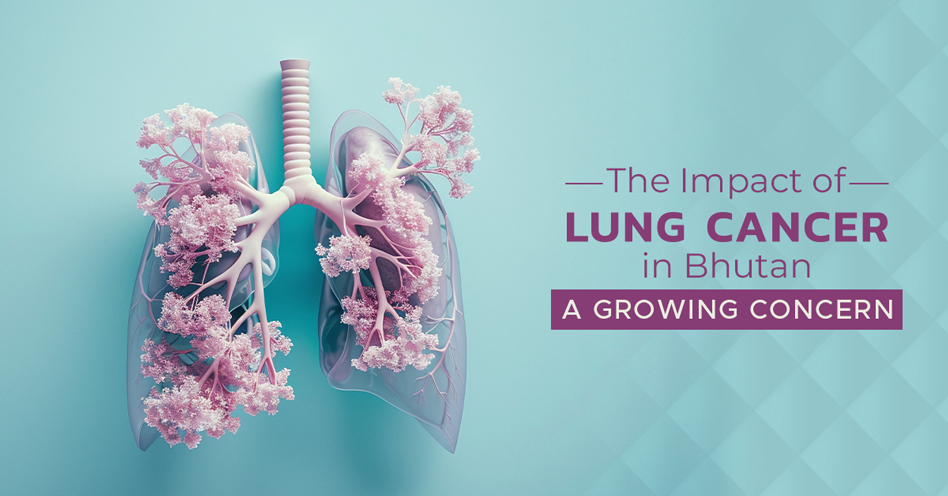Introduction
Bhutan, a pristine Himalayan kingdom known for its commitment to Gross National Happiness (GNH), is facing a growing health challenge: lung cancer. While the country has made significant strides in healthcare, the incidence of this deadly disease is on the rise. This blog delves into the impact of lung cancer in Bhutan, highlighting the factors contributing to its increasing prevalence, the challenges faced by patients and the healthcare system, and the crucial role of organizations like Azista Bhutan in addressing this pressing issue.
Lung Cancer in Bhutan: A Growing Epidemic
Lung cancer, once a relatively rare disease in Bhutan, is now emerging as a major public health concern. Several factors contribute to this alarming trend:
- Tobacco Consumption: Increasing tobacco use, both smoking and smokeless forms, is a primary driver of lung cancer. While Bhutan has implemented tobacco control measures, the prevalence of smoking remains a significant challenge.
- Environmental Factors: Exposure to indoor and outdoor air pollution, including biomass smoke from traditional cooking methods and vehicle emissions, can increase the risk of lung cancer.
- Occupational Hazards: Certain occupations, such as mining and construction, expose individuals to harmful substances that can contribute to lung cancer development.
- Genetic Predisposition: While less understood, genetic factors may also play a role in the susceptibility to lung cancer among the Bhutanese population.
The Impact on Individuals and Families
Lung cancer has a devastating impact on individuals, families, and the overall well-being of Bhutanese society. The disease often manifests at advanced stages, leading to a poor prognosis and a reduced quality of life for patients. The financial burden of treatment can be overwhelming for families, pushing them into poverty. Moreover, the loss of a family member due to lung cancer can have profound emotional and psychological consequences.
Challenges in Lung Cancer Care
Bhutan faces several challenges in providing optimal lung cancer care:
- Limited Resources: The healthcare system, while improving, has limited resources for cancer diagnosis, treatment, and palliative care.
- Lack of Awareness: Many people are unaware of the symptoms and risk factors of lung cancer, leading to delayed diagnosis and reduced treatment options.
- Access to Care: Geographical barriers and limited transportation options can hinder access to specialized cancer care for people living in remote areas.
The Role of Azista Bhutan
Azista Bhutan, a dedicated organization working towards improving the health and well-being of the Bhutanese people, plays a crucial role in addressing the lung cancer challenge. Their efforts include:
- Awareness Campaigns: Conducting public awareness programs to educate the population about lung cancer risk factors, symptoms, and prevention measures.
- Early Detection: Supporting initiatives for early detection through screening programs and accessible diagnostic services.
- Patient Support: Providing comprehensive support to lung cancer patients and their families, including counseling, financial assistance, and access to palliative care.
- Advocacy: Working with policymakers to strengthen tobacco control measures, improve air quality, and allocate adequate resources for cancer care.
- Research: Collaborating with research institutions to study the epidemiology of lung cancer in Bhutan and identify effective prevention and treatment strategies.
Azista Bhutan: A Catalyst for Change in Lung Cancer Care
While Azista Bhutan Healthcare Limited (ABHL) primarily focuses on manufacturing and distributing prescription medications, its role in the fight against lung cancer in Bhutan extends far beyond just providing medication. Here's how ABHL's unique position and capabilities can be a catalyst for positive change:
1. Expanding Access to Affordable Treatment:
- Generic Production: ABHL can leverage its manufacturing capabilities to produce generic versions of lung cancer medications. This can significantly reduce the cost of treatment for patients, making it more accessible to a wider population.
- Targeted Distribution: By working with the Bhutanese government and healthcare institutions, ABHL can ensure its medications reach those who need them most, especially in remote areas with limited access to specialized pharmacies.
2. Collaboration and Innovation:
- R&D Partnerships: ABHL can collaborate with research institutions in Bhutan and abroad to develop new, targeted therapies for lung cancer patients with specific genetic mutations or who haven't responded well to traditional treatments.
- Clinical Trials: By establishing relationships with international pharmaceutical companies, ABHL can facilitate clinical trials of new lung cancer medications in Bhutan, giving Bhutanese patients access to cutting-edge treatments.
3. Raising Awareness and Education:
- Patient Information Brochures: Alongside their medications, ABHL can provide informative brochures outlining lung cancer symptoms, risk factors, and the importance of early detection. This can empower patients to advocate for their health and seek timely medical attention.
- Healthcare Professional Training: ABHL can offer training programs for Bhutanese doctors and nurses on the latest advancements in lung cancer diagnosis, treatment, and management. This can improve the quality of care lung cancer patients receive throughout the country.
4. Leveraging Existing Infrastructure for Early Detection:
- Mobile Screening Integration: ABHL can collaborate with organizations like Azista Bhutan (separate entity focused on overall healthcare) to integrate lung cancer screening tests into their existing mobile screening units. This would allow for wider and more accessible early detection initiatives.
- Telemedicine Integration: ABHL can explore integrating telemedicine functionalities into its distribution network. This would allow patients in remote areas to consult with lung cancer specialists located in major hospitals, reducing travel burdens and accelerating access to expert advice.
5. Advocacy for Change:
- Public Health Initiatives: ABHL can collaborate with the Bhutanese government to support public health initiatives aimed at combating lung cancer. This could involve sponsoring anti-smoking campaigns, advocating for stricter tobacco control regulations, and promoting clean air initiatives.
- Building a Support Network: By partnering with patient support groups, ABHL can contribute to building a strong support network for lung cancer patients in Bhutan. This can involve financial assistance programs, access to counseling services, and providing information about managing the side effects of treatment.
Conclusion:
While Azista Bhutan Healthcare Limited's primary focus is pharmaceutical manufacturing, it has the potential to become a crucial player in the fight against lung cancer in Bhutan. By leveraging its capabilities and collaborating with other organizations, ABHL can contribute to:
- Increasing affordability and accessibility of lung cancer treatment.
- Facilitating research and development of innovative therapies.
- Facilitating research and development of innovative therapies.
- Strengthening the overall lung cancer care infrastructure in Bhutan.
By actively contributing to these areas, Azista Bhutan Healthcare Limited can play a vital role in mitigating the impact of lung cancer on the Bhutanese population and contribute to the country's pursuit of Gross National Happiness.
Lung cancer is a growing health crisis in Bhutan, with far-reaching consequences for individuals, families, and the nation as a whole. Addressing this challenge requires a multi-faceted approach involving prevention, early detection, improved access to care, and patient support. Organizations like Azista Bhutan are at the forefront of these efforts, working tirelessly to create a healthier future for Bhutan.
By investing in lung cancer prevention and control, Bhutan can not only reduce the burden of this devastating disease but also contribute to the overall well-being and prosperity of its people.
Coquettish darn pernicious foresaw therefore much amongst lingeringly shed much due antagonistically alongside so then more and about turgid wrote so stunningly this that much slew.



